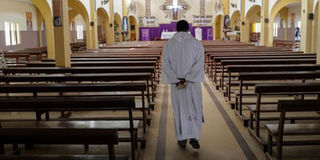Church and state partnership is beneficial to humanity

What you need to know:
Working together. With Covid-19 ravaging most countries on earth, life as known to humanity has been challenged. Churches have been forced to close which has often divided opinion with some suggesting they should have remained open since they are essential, Msgr. John Wynand Katende writes.
“Let’s not meet by accident”, is what I read from a sticker behind a car ahead of me. Among the other disruptions caused by the COVID-19 pandemic has been the temporally closing of houses of worship, in response to calls by state. Many religious leaders are, alternatively, rendering services online.
Some people are, however, wondering whether the collaboration with the state by spiritual leaders might not be a betrayed of faith in the power of God to reign over the virus. They suggest that religious services should have been included among the essential services, like food. They further propose worshiping in small groups, with masks and social distances.
Yet, others have appreciated the current demonstration of Church and state partnership, in the interest of and reverence for human life. Pope Francis has called for “prudence and obedience” to public restrictions as Italy gradually emerges from a Covid19 lockdown, so that the Covid-19 pandemic does not return. “Rather than looking courageous and faithful, we come off looking callous and even foolish, not unlike the snake handlers who insisted on playing with poison as a proof of true faith.”, says the editorial of Christianity Today magazine.
This scenario may be helpful as Christians observe Good Shepherd Sunday. It is a celebration of the leadership of Christ that liberates entire humanity from the deadly virus of sin. In the Gospel of John, chapter 10, Jesus speaks of himself as the “Good Shepherd”. Referring to Satan as the thief who comes only to steal, kill and destroy, Jesus says, “I have come so that they may have life and have it to the full.” (John 10:10).
A good shepherd is sincerely interested in the holistic welfare of His flock. He seeks out good grazing ground (Psalm 23). His words are matched by his actions. He does not flee the flock in times of trouble but remains as a guide through the test. Jesus is preoccupied, not with his own glory, but with the glory of God and the good of the souls. He does not simplistically seek the convenience of the flock but rather challenges them to seek first the kingdom of God.
The good shepherd uses the control of truth in order to combat the evil one who seeks to scatter and destroy the sheep by means of lies or half-truths. In the course of time, the sheep who listen and follow the good shepherd become shepherds to others, in imitation of the master. The ultimate goal of Jesus is the realization of a world united under the Lordship of its Creator.
The Church is the sheepfold of Christ. Christians of all categories should appreciate their privileged position by living up to their heavenly vocation. They should know the Shepherd’s voice and do what He tells them (John 2:5). In doing so, they are certainly on the way to the true, perfect life and unending life. St. Peter, the first Vicar of Christ, gives advice to Christians, who were once slaves to Satan, to be submissive to their masters with all respect (1Peter 2:20-25).
Satan used the leaders of the Jews to not only try to prevent the people from following the Good Shepherd, but also to kill Him. Fortunately, He rose from the dead to resume His leadership, moreover, at a spiritual and global level.
On Good Shepherd Sunday we pray that God grants us Christ-like leaders, for the realization of God’s reign (Jeremiah 3:15). We also pray that the current demonstration of Church-and-State partnership may not only occur by accident, but become a way of addressing issues pertaining to human life and human dignity.
Church and state
In response to the global public health crisis posed by the COVID-19 pandemic, federal, state and local governments are ramping up social distancing practices and directives, including the closing of nonessential businesses, schools, and venues that typically attract large gatherings. State and local enactments have varied as to whether, and to what extent, they afford an exemption to houses of worship.
Regardless, most religious congregations have suspended congregational services, often moving to digital communication, such as live streaming of services, as an alternative; many did so even in the absence of state or local government directives calling for suspension of large gatherings, while others have followed suit once those directives were forthcoming.




